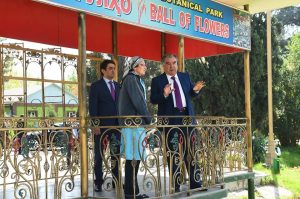On April 3, the day after I wrote an article noting that the only regional leader Uzbek President Shavkat Mirziyoyev had not spoken over the phone with in recent weeks was Tajik President Emomali Rahmon, Mirziyoyev and Rahmon finally connected.
In the week since I wrote that article, Rahmon has spoken over the phone with Mirziyoyev twice (April 3 and April 9) and Kazakh President Kassym-Jomart Tokayev once (April 9).
Some necessary disclaimers: Such calls are only marginally useful in mapping out relations between states and leaders. The readouts are naturally government-produced and range from simply anodyne to enragingly useless. The level of detail varies widely from stating the sheer fact there was a conversation to a decent rundown of the topics covered and who called whom. There’s also nothing to say these are the only calls between leaders, as it’s entirely possible that a government might not put out a press release about a call. But such calls, when we know about them, are points of data worth considering.
All phone calls have two versions, so let’s look at the Uzbek and Kazakh side of the line first.
The Uzbek releases state that Mirziyoyev held telephone conversations with Rahmon on April 3 and April 9. On the earlier call, according to Tashkent, the leaders exchanged Nowruz greetings and then the usual filler about discussing bilateral cooperation. And then the real reason for the call: “Particular attention,” the readout states, was paid to “the issues of interaction and close coordination in order to prevent the spread of coronavirus infection and effectively counteract the consequences of a pandemic in the region.” The April 9 call was even more clearly just about COVID-19, mentioning the importance of coordination, mutual assistance, and close contact.
The Uzbek readouts do not state who initiated the call, but the Kazakhs do. In the readout of Tokayev’s April 9 call with Rahmon, the Kazakhs state that the call occurred at the “initiative” of the Tajik side. That call, like Rahmon’s same-day chat with Mirziyoyev, was about the pandemic. The Kazakh readout has some juicy details: Kazakhstan provided 5,000 tons of flour that Tajikistan, per the Kazakh version, made an appeal for.
What do the Tajik versions say about these calls?
A review of Rahmon’s announced calls reveals that Rahmon first spoke to Kyrgyz President Sooronbay Jeenbekov. That call, on March 28, was exclusively about the coronavirus pandemic, with the two sides agreeing to “intensify collaboration to prevent the spread of the cross-border COVID-19 infection.” A worrying bulk of Kyrgyzstan’s COVID-19 cases stem from clusters in the country’s south, in the complex border areas of the Fergana Valley where Tajikistan, Kyrgyzstan, and Uzbekistan meet.
The April 4 call with Mirziyoyev focused on COVID-19 as well, with apparent instructions to kick further collaboration down to the respective prime ministers — presumably for quicker and more sustained action. The April 9 call with Mirziyoyev, per the Tajik version, included thanks to Uzbekistan for humanitarian assistance — food and medical supplies — to prevent the spread of the coronavirus.
The April 9 call with Tokayev includes thanks for humanitarian assistance, mention of the pandemic, and an expression of willingness, on the Tajik side, to provide fresh fruit and vegetables.
Ultimately, the calls demonstrate that Rahmon is discussing the coronavirus with the leaders of the region, even if he isn’t talking seriously about it with his own people. To date, Tajikistan has not announced the confirmation of any COVID-19 cases.

































